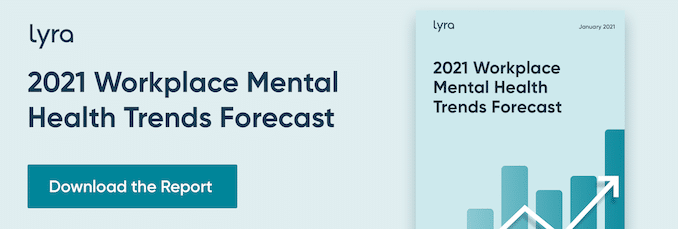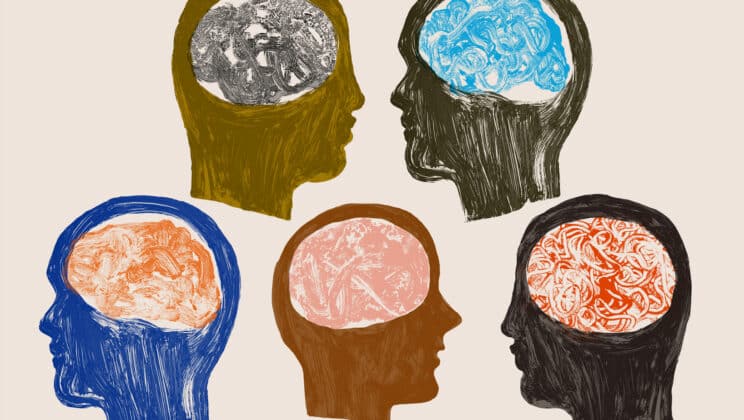Your 2021 Workplace Mental Health Trends Forecast
January 6, 2021
2020 was marked by ongoing consecutive crises that have left few people untouched. The coronavirus pandemic has dramatically shifted the way we live, work, and connect with others. Amid unprecedented disruptions, uncertainty, and devastation, the need for workforce mental health support has become more urgent than ever. And while 2021 offers glimmers of hope for a return to quasi-normalcy, there is still an overwhelming need to support employees struggling with anxiety, depression, substance use, loneliness, concerns for their children’s mental health, and rising stress.
With that in mind, employers in 2021 are increasingly focused on effective solutions to address employee mental health. In fact, Lyra’s December survey of 300 human resources and benefits leaders found the following:
- 86 percent said mental health became a higher priority for their company in 2020.
- 54 percent said their employees now have higher expectations in regards to mental health support from their employers.
With awareness and demand for better mental health solutions at an all-time high, what are the best next steps for employers? Based on our recent employer surveys as well as insights from leading benefits and HR professionals, benefits consultants, and mental health clinicians, these are some of the benefit trends we expect to see shape workforce mental health in the year ahead:
Greater adoption of comprehensive benefits that address the whole mental health spectrum
When HR and benefits leaders were asked how they believed the mental health care system could be improved within companies, 41 percent said they would choose a “new, comprehensive solution that spans existing services of employee assistance programs (EAPs) and health plans, plus gaps beyond traditional solutions.”
Higher demand for measurement-based care
Next-generation mental health solutions will continue to deliver innovative new care models. Using a digital provider network means these solutions can now offer a robust technology platform that not only connects providers with clients, but also tools for measuring symptom improvement. Add to this new approaches to outcome-based provider incentives, and we see significant strides in both access to care and positive outcomes. Plus, measurement-based care not only tends to yield better mental health outcomes for members, but lower overall costs for employers.
More tailored mental health support for underrepresented employee groups.
In 2021, we recommend that people leaders focus more deeply on mental health care and support that addresses the needs of BIPOC employees, as well as other underrepresented employee groups, including LGBTQ+ employees, parents, and other caregivers. Among other things, this will mean ensuring access to culturally responsive mental health care providers who are trained to treat race-based stress and trauma, and seeking benefits vendors with a provider network that reflects companies’ workforce diversity.
Want to learn more about the state of mental health in 2021? Download the full report for more mental health benefits trends, data, and predictions.

CONTACT US
If you want help connecting with a therapist, Lyra can assist you. You can get started today if Lyra is offered by your employer. Sign up now.
For employers who want to learn more about how Lyra’s enhanced EAP addresses network adequacy and quality issues, download our whitepaper on quality or get in touch.
And check in frequently here or follow us on Facebook, LinkedIn, and Twitter for more insights into supporting employees’ mental health.
DISCLAIMER
The content of this blog is not intended to be a substitute for professional medical advice, diagnosis, or treatment.
Explore additional blogs

Mental health at work
6 Strategies to Support Neurodiversity in the Workplace

Mental health at work
From Good to Great: How to Elevate Employee Job Performance

Mental health at work